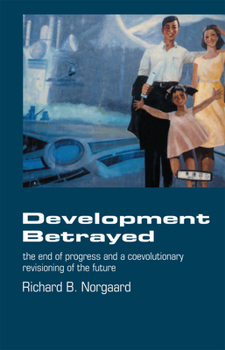Development Betrayed: The End of Progress and a Co-Evolutionary Revisioning of the Future
Select Format
Select Condition 
Book Overview
Modernity promised control over nature through science, material abundance through technology and effective government through rational, social organization. Instead of leading to this promised land it has brought us to the brink of environmental and cultural disaster. Why has there been this gap between modernity's aspirations and its achievements? Development Betrayed offers a powerful answer to this question.
Development with its unshakeable commitment to the idea of progress, is rooted in modernism and has been betrayed by each of its major tenets. Attempts to control nature have led to the brink of environmental catastrophe. Western technologies have proved inappropriate for the needs of the South, and governments are unable to respond effectively to the crises that have resulted.
Offering a thorough and lively critiques of the ideas behind development, Richard Norgaard also offers an alternative co-evolutionary paradigm, in which development is portrayed as a co-evolution between cultural and ecological systems. Rather than a future with all peoples merging to one best way of knowing and doing things, he envisions a future of a patchwork quilt of cultures with real possibilities for harmony.
Development with its unshakeable commitment to the idea of progress, is rooted in modernism and has been betrayed by each of its major tenets. Attempts to control nature have led to the brink of environmental catastrophe. Western technologies have proved inappropriate for the needs of the South, and governments are unable to respond effectively to the crises that have resulted.
Offering a thorough and lively critiques of the ideas behind development, Richard Norgaard also offers an alternative co-evolutionary paradigm, in which development is portrayed as a co-evolution between cultural and ecological systems. Rather than a future with all peoples merging to one best way of knowing and doing things, he envisions a future of a patchwork quilt of cultures with real possibilities for harmony.
Format:Paperback
Language:English
ISBN:0415068622
ISBN13:9780415068628
Release Date:March 1994
Publisher:Routledge
Length:296 Pages
Weight:1.08 lbs.
Dimensions:0.9" x 6.2" x 9.2"
Age Range:18 years and up
Grade Range:Postsecondary
Customer Reviews
1 rating
Imagining how a better world might come to pass
Published by Thriftbooks.com User , 19 years ago
Norgarrd's 1994 book is his only one, and it is very unconventional in style, form and content. His text is dense but bereft of jargon and citations, which he deals with in detailed bibliographic essays at the end. The book's rigor is not represented in the title, but the title does show the extent that Norgarrd will be attacking traditional conceptions of development, environment and economics. His basic thesis conceives of a co-evolutionary theory, where "the world can be thought of as having become a patchwork quilt of loosely interconnected, co-evolving social and ecological systems." 90 These social, economic, cultural, religious, business and family systems do not exist in a vacuum but co-evolve together. Norgarrd is a Economics Professor at UC Berkeley and his most incisive critiques are of conventional economic thinking, in a vein similar to that offered by JK Galbraith. "The logic of economics does not yield unique answers when more than one social unit might express an interest in choosing. Without a single answer, economics cannot be used technocratically to deduce what society should do." 125 His solution is to put more weight behind the power of "groups as decision making units". "The modern portrayal of social systems as the sum of the interactions of autonomous individuals responding to their individual values DENIES interconnections between people and nature and thereby both the existence of and the need for social and environmental values." 131 Norgarrd's more specific suggestions to how our world can be conceptualized better, work well in concert with JK Galbraith's critique of standard economic logic. This is a well thought out book that anyone who is concerned about more accurate economic assessment of environment should read.





